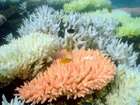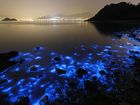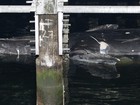It's showtime for Pluto.
NASA's New Horizons spacecraft has traveled 3 billion miles and is nearing the end of its nine-year journey to Pluto. Sunday, it begins photographing the mysterious, unexplored, icy world once deemed a planet.
 Full Story
Full Story
Facing critical dangers like rising seas and the impact of climate change on marine life, US scientists need more funding in the next decade, officials said Friday.
A new report from the National Research Council is calling for cuts in money spent on infrastructure and more cash devoted to basic scientific research from 2015-2025.
 Full Story
Full Story
Australia has ordered a ban on dumping dredge waste on most of the Great Barrier Reef, the environment minister said Saturday, as part of a push to stop the U.N. declaring the site in danger.
Environment Minister Greg Hunt said he had ordered the Great Barrier Reef Marine Park Authority to develop regulations to stop waste from capital dredging being dumped in the park "once and for all".
 Full Story
Full Story
Eerie fluorescent blue patches of water glimmering off Hong Kong's seashore are magnificent, disturbing and potentially toxic, marine biologists say.
The glow is an indicator of a harmful algal bloom created by something called Noctiluca scintillans, nicknamed Sea Sparkle.
 Full Story
Full Story
A 32-foot gray whale that turned up dead under the Washington state ferry terminal in downtown Seattle has been moved so biologists can figure out why it died.
The whale was towed from the dock to a nearby location Thursday afternoon, said Broch Bender, a spokeswoman for the Washington State Ferries. The plan is to move it to another secure location for an autopsy.
 Full Story
Full Story
Climate change and the danger of nuclear war pose an ever-growing threat to civilization and are bringing the world closer to doomsday, a group of prominent scientists and Nobel laureates said Thursday.
"It is now three minutes to midnight," said Kennette Benedict, executive director of the Bulletin of the Atomic Scientists, as the group moved its symbolic "Doomsday Clock" two minutes forward.
 Full Story
Full Story
The hand structure of early human ancestors who lived 3.2 million years ago suggests they had the ability to grasp and use tools, even if they hadn't invented them yet, anthropologists said Thursday.
Until now, Australopithecus africanus, which lived two to three million years ago in what is now South Africa, were not believed to have made tools -- the first evidence of which dates back to 2.6 million years ago -- but their hands suggest otherwise, according to a study in the journal Science.
 Full Story
Full Story
San Francisco Bay Area officials have begun laboratory tests and necropsies on dead seabirds found coated with a mysterious substance that looks and feels like dirty rubber cement.
About 200 dead birds have been found along the bay's shorelines, said Andrew Hughan, spokesman for the California Department of Fish and Wildlife.
 Full Story
Full Story
An asteroid up to 1,800 feet across is headed Earth's way. But don't worry: It will miss us by 745,000 miles, about three times the distance between Earth and the moon.
Still, that's close for such a large rock.
 Full Story
Full Story
The skies of China's notoriously smog-filled cities saw a marginal amelioration last year, according to figures released by Greenpeace Thursday, but pollution remained far above national and international standards.
China's cities are often hit by heavy pollution, blamed on coal-burning by power stations and industry, as well as vehicle use, and it has become a major source of discontent with the ruling Communist Party.
 Full Story
Full Story



